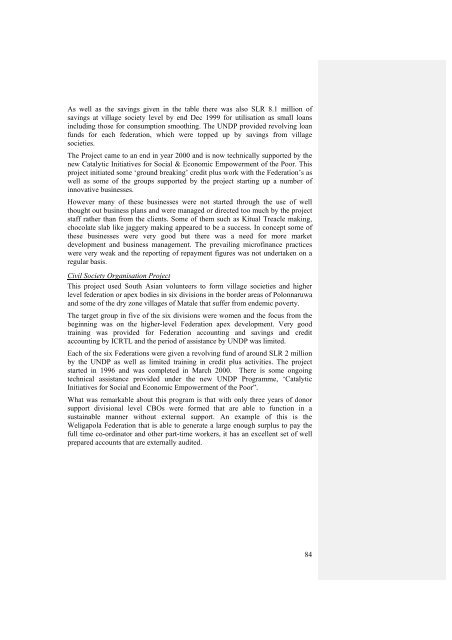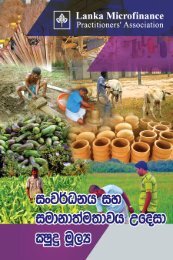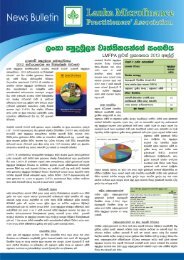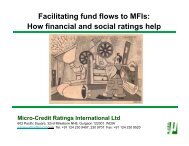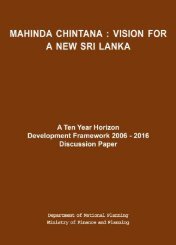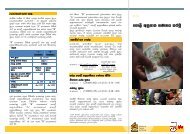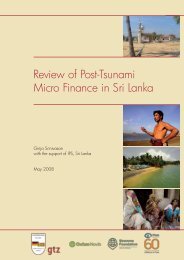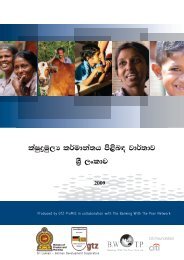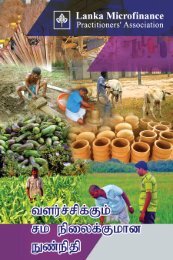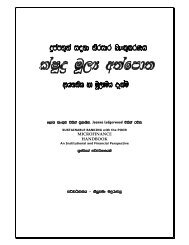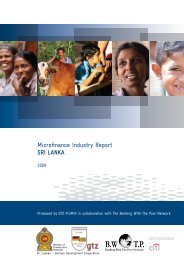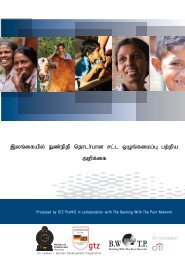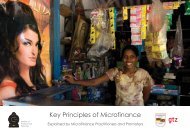National Microfinance Study of Sri Lanka: Survey of Practices and ...
National Microfinance Study of Sri Lanka: Survey of Practices and ...
National Microfinance Study of Sri Lanka: Survey of Practices and ...
You also want an ePaper? Increase the reach of your titles
YUMPU automatically turns print PDFs into web optimized ePapers that Google loves.
As well as the savings given in the table there was also SLR 8.1 million <strong>of</strong><br />
savings at village society level by end Dec 1999 for utilisation as small loans<br />
including those for consumption smoothing. The UNDP provided revolving loan<br />
funds for each federation, which were topped up by savings from village<br />
societies.<br />
The Project came to an end in year 2000 <strong>and</strong> is now technically supported by the<br />
new Catalytic Initiatives for Social & Economic Empowerment <strong>of</strong> the Poor. This<br />
project initiated some ‘ground breaking’ credit plus work with the Federation’s as<br />
well as some <strong>of</strong> the groups supported by the project starting up a number <strong>of</strong><br />
innovative businesses.<br />
However many <strong>of</strong> these businesses were not started through the use <strong>of</strong> well<br />
thought out business plans <strong>and</strong> were managed or directed too much by the project<br />
staff rather than from the clients. Some <strong>of</strong> them such as Kitual Treacle making,<br />
chocolate slab like jaggery making appeared to be a success. In concept some <strong>of</strong><br />
these businesses were very good but there was a need for more market<br />
development <strong>and</strong> business management. The prevailing micr<strong>of</strong>inance practices<br />
were very weak <strong>and</strong> the reporting <strong>of</strong> repayment figures was not undertaken on a<br />
regular basis.<br />
Civil Society Organisation Project<br />
This project used South Asian volunteers to form village societies <strong>and</strong> higher<br />
level federation or apex bodies in six divisions in the border areas <strong>of</strong> Polonnaruwa<br />
<strong>and</strong> some <strong>of</strong> the dry zone villages <strong>of</strong> Matale that suffer from endemic poverty.<br />
The target group in five <strong>of</strong> the six divisions were women <strong>and</strong> the focus from the<br />
beginning was on the higher-level Federation apex development. Very good<br />
training was provided for Federation accounting <strong>and</strong> savings <strong>and</strong> credit<br />
accounting by ICRTL <strong>and</strong> the period <strong>of</strong> assistance by UNDP was limited.<br />
Each <strong>of</strong> the six Federations were given a revolving fund <strong>of</strong> around SLR 2 million<br />
by the UNDP as well as limited training in credit plus activities. The project<br />
started in 1996 <strong>and</strong> was completed in March 2000. There is some ongoing<br />
technical assistance provided under the new UNDP Programme, ‘Catalytic<br />
Initiatives for Social <strong>and</strong> Economic Empowerment <strong>of</strong> the Poor”.<br />
What was remarkable about this program is that with only three years <strong>of</strong> donor<br />
support divisional level CBOs were formed that are able to function in a<br />
sustainable manner without external support. An example <strong>of</strong> this is the<br />
Weligapola Federation that is able to generate a large enough surplus to pay the<br />
full time co-ordinator <strong>and</strong> other part-time workers, it has an excellent set <strong>of</strong> well<br />
prepared accounts that are externally audited.<br />
84


